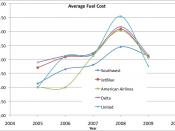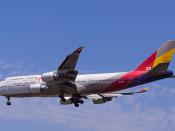The importance of the airline industry to the economy, the nation, and the basic standard of living by Americans was made evident by the horrific events of September 11, 2001. The airline industry has desperately tried to recuperate its' losses due to that fatal day nearly two years ago. As airlines begin to catch a glimpse of hope for the future, there are three factors that they must deal with that have become the most significant problems that they face. These problems are escalating fuel prices, increased insurance costs, and rising security costs.
Fuel comprises the airline industry's second-largest operating expense following labor. According to the Air Transport Association, during times of moderate gas prices, the price of fuel costs the industry 10 to 12 percent of its expenses. As the war in Iraq continues, the costs of fuel are climbing towards 15 percent. With every one-cent increase in the cost of jet fuel, the industry must shell out an extra $180 million a year.
In the past, fuel hikes and passenger recession have been cause for economic hardship throughout the industry. As a result, profitability has suffered due to the weakening economy.
The airlines are doing what they can to save fuel in any way, shape or form. Airlines have always pursued the most fuel-efficient aircraft possible. They have gone as far as to work with airframe and engine manufacturers in order to reduce fuel consumption. The aircrafts today are three times more fuel-efficient than those of the first OPEC fuel crisis. The airlines' conservation methods are inadequate as the price of fuel continues to increase, causing a rise in industry losses.
From the beginning of 2002 until November of that year, spot prices for jet fuel rose 27 percent. Since December '02, spot prices have increased an additional...


